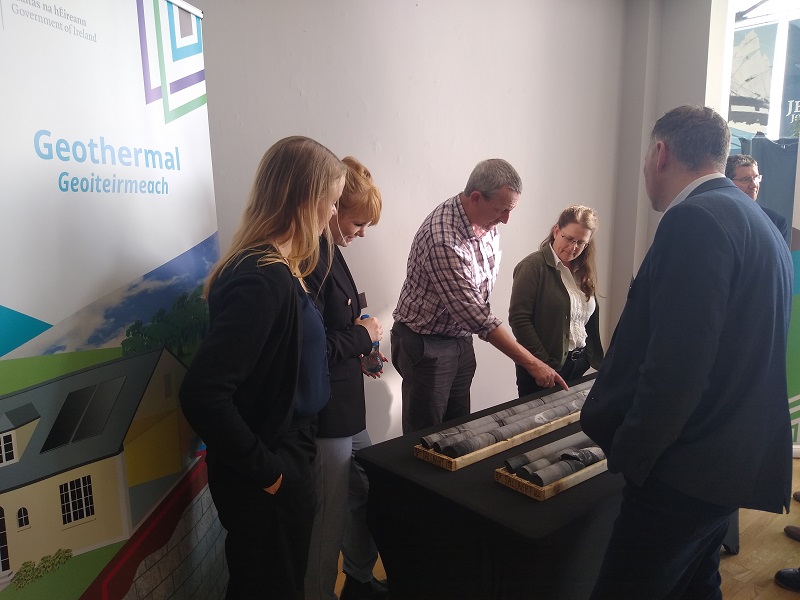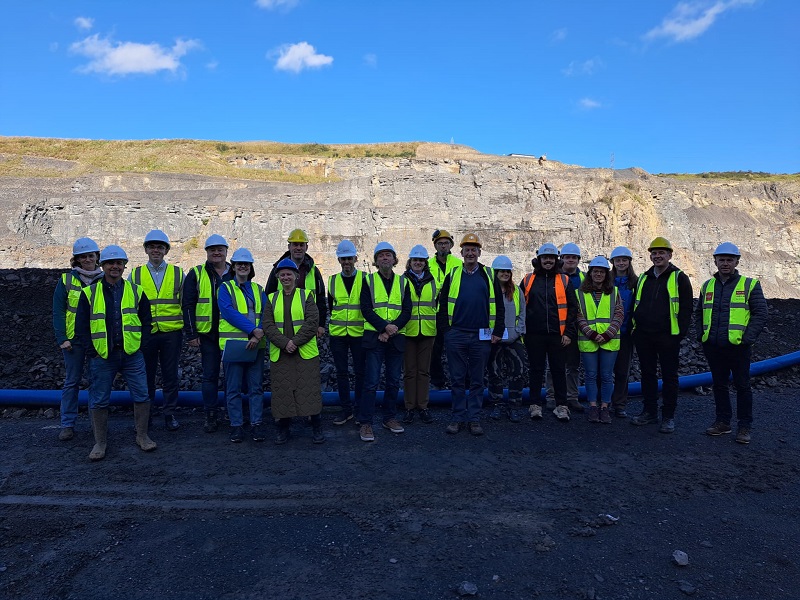National Geothermal Energy Summit 2024
The 3rd National Geothermal Energy Summit took place on 13 November 2024. The event was highly successful with over 200 registered attendees.
The Summit brought together stakeholders from policy, the public and private sectors, industry, and research, all of whom gave insight in how to drive geothermal energy development forward in Ireland.
Presentations are available below
The poster session programme is available here .

From left to right: Loïc Quiquerez (SIG), Neil O'Leary (CODEMA), Andrea Carroll (daa), Stephen Cull (Dublin City Council) and Niamh O'Sullivan (SEAI) closing Session 2.
GeoEnergyNI joined us for the day with their GeoEnergy Roadshow to help demonstrate the depths at which drilled boreholes can reach with the use of on-board Virtual Reality headsets. The GeoEnergy Roadshow was a fantastic addition to the Summit.
.jpg)
Courtesy of geoenergyni.org
If you need more information, please email geothermal@gsi.ie.
Read about our previous two Geothermal Summit Events below.
Geothermal Week 2023
From Tuesday to Thursday, 10 - 12, October, 2023, Geological Survey Ireland hosted a number of geothermal events, including a workshop and geothermal field trip.
On Tuesday, 10 October, Geological Survey Ireland hosted a workshop on geothermal energy for decarbonising city and campus heat networks. This international event was in collaboration with the Geothermica Initiative and the Clean Energy Transition Partnership; two European networks supporting research and innovation projects in the geothermal energy area. Speakers from across Europe and North America presented and discussed geothermal energy projects. The day demonstrated value and the benefit of knowledge sharing events for new energy options for Ireland. You can find the
presentations and more information on the workshop
here.

The main event of Geothermal Week was the second annual National Geothermal Energy Summit on 11 October, at Technological University Dublin's Grangegorman campus, and brought together a diverse, multi-disciplinary group for a series of panel discussions on the latest developments in Irish geothermal energy, with useful and lively contributions from more than 100 attendees. Invited speakers discussed topics ranging from Ireland's new Geothermal Policy Statement (GSPD in DECC) and the role of geothermal energy in district heating networks, to decarbonising public sector spaces with geothermal heat, and geothermal opportunities for the Just Transition.
Presentations are available here
Policy Updates
Session 1 - Decarbonising public sector buildings with geothermal heat
Session 2 - District Heating and Geothermal Energy
Session 3 - Geothermal Opportunities for a Just Transition

In addition to these events, Geothermal Week included a geothermal field trip on 12 October. The purpose of the trip was to demonstrate geothermal energy in use right now and illustrate some geothermal energy concepts. The attendees included campus managers, County Council officials and experts in the fields of district heating and energy. The itinerary included four stops; the Rubrics building geothermal retrofit at Trinity College Dublin, Roadstone's Huntstown Quarry to look at the underlying bedrock of Dublin and discuss some of its geothermal qualities, Geological Survey Ireland's drill rig at TU Dublin's Tallaght campus (which was at the time of the visit drilling to 1,000 m below the surface to measure the temperature at depth), and finally, a short guided tour of Geological Survey Ireland's 'Down to Earth' Exhibition at the National Museum of Ireland Collins' Barracks location (now closed).

National Geothermal Energy Summit 2022
Presentations now available
here.
Our geothermal resources present a pathway towards a secure, clean and decarbonised heat sector for Ireland, yet they are under-developed at present. Geological Survey Ireland held the first National Geothermal Energy Summit on 9 November 2022 at TU Dublin's Grangegorman campus. This event brought together experts from the worlds of policy, industry, and research to discuss the vision for the future of geothermal energy in Ireland. You can view the programme for the day
here and the press release
here.
The well-attended event took place in the refurbished St. Laurence's church, where we were encouraged by one speaker to say "we do!" to geothermal energy. Participants came from a wide range of mostly public sector organisations, including government departments, agencies, universities, local authorities and semi-state bodies. The meeting was addressed by Minister Ossian Smyth T.D., who confirmed his government's support for geothermal energy and the role it can play in supporting district heating, including through the work of the Department of the Environment, Climate and Communications: "geothermal energy can help the climate emergency and the need to decarbonise our energy systems – particularly our heat sector – and the critical issue of energy security".
For their presentations, invited speakers were asked to address the following themes:
Geothermal policy development; how do we unlock our geothermal potential?
The first session was dedicated to geothermal policy, and the steps we need to take now to unlock our geothermal energy potential for 2030 targets and beyond. Sarah Blake (Geological Survey Ireland) and Ian Devlin (Geoscience Policy Division) presented on DECC's activities to overcome barriers to large-scale geothermal rollout. We then heard about the health of the geothermal sector in Europe (Sanjeev Kumar, EGEC) and how policy has facilitated the rapid growth of the geothermal industry in the Netherlands (Harmen Mijnlieff, TNO). Mark Palmer (QUB) finished the session with a social scientist's perspective on "policymaking a geothermal community marketplace" in Northern Ireland. A major takeaway from the Q&A panel session was that while more geoscience data is required to accurately quantify our geothermal resources, we must also think carefully about how to communicate that information to individuals, businesses, and community groups.
Placing geothermal energy in the mix for district heating
The publication of the National Heat Study by SEAI in early 2022 has highlighted the importance of district heating for decarbonising our heat sector quickly and in line with our climate goals. This is good news for geothermal energy, as large-scale projects such as district heating networks unlock (initially expensive) deep geothermal energy as a viable renewable energy option. Our second session kicked off with two presentations showcasing a large shallow geothermal installation in University of Galway (Tiernan Henry, UG) and a very deep geothermal district heating network at the Eden Project in Cornwall (Robbie Bilsland, Eden Geothermal Ltd.). Our hosts for the day, TU Dublin, then outlined their own vision and plans for a deep geothermal borehole to provide low carbon heating across campus (Paul McDunphy, TU Dublin). We heard some key insights and recommendations from the National Heat Study (Niamh O'Sullivan, SEAI) and the session was wrapped up by Danielle McCormack (DECC) who presented on the work of the Department's District Heating Steering Group.
Quantifying our geothermal potential
As geoscientists we couldn't resist holding a session dedicated to geological data! Geological Survey Ireland has consistently highlighted the need to improve our understanding of the deep subsurface to quantify our geothermal resources and allow policymakers to set meaningful targets for the development of the sector. In this session we heard about the creation of a new National Geothermal Database (Rory Dunphy, Geological Survey Ireland). The next three presentations showcased some of the academic research supported by Geological Survey Ireland, which has in turn improved our national models and databases. Academic researchers presented on how to use existing and historical data to understand geothermal potential in Ireland (Koen Torremans, UCD; John Walsh, UCD) and where best to prioritise collecting new data to allow existing subsurface models to be improved (Emma Chambers, DIAS).
How can we build and support our geothermal sector?
In our final session we heard from entrepreneurs and industry representatives (Riccardo Pasquali, Geoserv; Niall McCormack, Geothermal Association of Ireland) about what the growing geothermal sector needs to progress and scale up. We also heard how financial risks and high CAPEX investments can be managed for geothermal projects using examples from France (Christian Boissavy, GEODEEP).
In our final session we heard from entrepreneurs and industry representatives (Riccardo Pasquali, Geoserv; Niall McCormack, Geothermal Association of Ireland) about what the growing geothermal sector needs to progress and scale up. We also heard how financial risks and high CAPEX investments can be managed for geothermal projects using examples from France (Christian Boissavy, GEODEEP).
We rounded out the day with a final panel discussion and asked several key speakers for their recommendations on next steps for the sector. The following were some of the key takeaway messages.
- Data gathering is important, but we also need to interpret and present it in a clearly useable format for different stakeholder groups.
- We need to invest in collecting more data for public databases and increase our capacity to turn the raw data into useful outputs.
- We need to continue to fund research and innovation projects with academia and industry.
- For urban locations and relatively small sites with a high heat demand, deep geothermal is often the only viable option to meet renewable heating requirements (as in the case of TU Dublin).
- Early outreach and communication to public stakeholders is vital to the success of geothermal projects.
- Increased training of geothermal installers will help to standardise the industry and prevent poor design.
- Networking and cross-collaboration at a departmental and agency level is key to ensuring that geothermal energy is considered equally alongside other renewable energy sources as energy policy is developed.
Workshop on Low-medium Temperature Geothermal Heating & Cooling Solutions Proceedings are available
here.